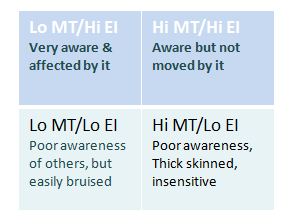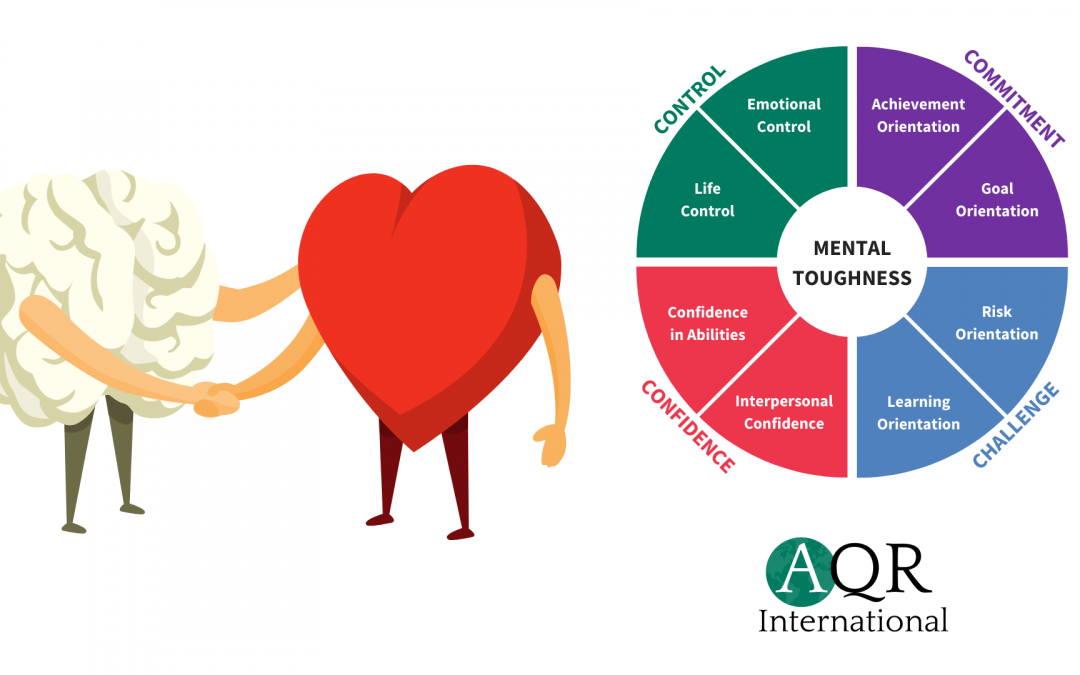Is there a relationship between these two ideas is a frequently asked question. It’s a good question and, like all the best questions, it has a potentially complex answer.
At its simplest EI describes the extent to which you are sensitive to the emotions and feelings of others particularly when you say or do something which impacts them in some way. It also describes the extent to which you are emotionally sensitive to the actions, words and deeds of others. That is, to what extent you are aware of your emotional reactions to their feelings and emotions.
Essentially it is about emotional sensitivity to the world around you. It doesn’t necessarily indicate how you will respond as a result of this sensitivity.
MT can appear to describe something similar but it is importantly different.
Personality is often described as the manifestation of our habitual response to events. One aspect is “how we act when things happen” – this is behaviour. Another is “how we emote when things happen” – this is emotions. Underpinning both is “how we think when things happen” – this is what mental toughness describes.
The way we think about a situation will determine to a large extent our behavioural and our emotional responses. Research has shown how Mental Toughness relates to the Big 5 personality model (described in another article in this series).
If we look at Goleman’s model of EI it is possible to see a direct connection with three of Goleman’s characteristics – Moods Management; Self Motivation and Relationship Management.
- Self-awareness – knowing your emotion, recognising feelings as they occur and discriminating between them.
- Mood Management – the ability to deal with feelings and respond appropriately to different situations – this relates to Emotional control
- Self-motivation – directing yourself towards a goal, despite self-doubt, disinterest and distractions – this relates to both Goal Orientation and Achievement Orientation
- Empathy – ability to recognise and respond to feelings of others both verbally and non-verbally
- Relationship Management – positive and mutually beneficial interpersonal interaction, conflict resolution and negotiation. – this relates to Interpersonal Confidence and possibly even Learning Orientation when that requires engagement with others.
And Self-awareness is also important in the Mental Toughness concept.
Nevertheless, it also the case, as with behaviour, that there will be other factors that come into play in Emotional intelligence so the two concepts although related, can also be different.
One useful way of exploring the significance of this is to look at the interplay between Mental Toughness and Emotional intelligence through a 4 quadrant matrix shown below.
This shows the possible outcomes for combinations of high and low positions for EI and MT.

So someone with high EI and high MT might be sensitive to the emotions and feelings of others and will be effective at managing their response to these. Which is what research at the University of Lincoln indicates. Someone with low EI and high MT might emerge as insensitive to others emotions and feeling and in this case, their high MT might emerge in seeming “thick-skinned”. And so on.
The 2009 study (University of Lincoln – Dr Lee Crust) on Mental Toughness and Affect Intensity* in sportspeople showed:
- Mentally tough individuals are as emotionally literate as anyone else
- Mentally tough people handle emotions better than most people
- No differences between males and females either in Mental Toughness or Affect Intensity
Studies have since confirmed that the more Mentally Tough are statistically likely to be more emotionally intelligent than the more Mentally sensitive.
*Affect Intensity is the strength with which people experience emotion.
The research also indicated that those who are more mentally tough also tend to be “more comfortable in their own skin” which can often mean they are more open to connecting with others and their feelings and emotions.
This is perhaps confounded a little by the ongoing debate about what exactly EI is.
Perhaps more interesting is the new thinking around Intelligent Emotions (advocated by Professor Paul Brown amongst others). This resonates closely with the Emotional Control scale in Mental Toughness and suggests that individuals with this kind of Intelligence are able to impact the mood of others around them by (authentic) displays of feelings and emotions. In turn that can provide positive feedback to the individual and enable them to manage their own mood and emotions.
If your interest is piqued to learn more about your own Mental Toughness profile and how to assess and develop Mental Toughness, please visit www.aqrinternational.co.uk and if interested in being a licensed user, contact us through the site or through Headoffice@aqr.co.uk. Feel free to connect with me too on LinkedIn or via doug@aqr.co.uk


